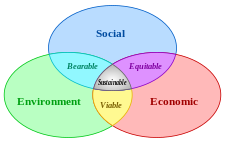Energy economics: Difference between revisions
→Leading energy economists: EL to ref |
→Sources, links and portals: EL to WL |
||
| Line 38: | Line 38: | ||
Leading journals of energy economics include: |
Leading journals of energy economics include: |
||
* ''[[Energy Economics (journal)|Energy Economics]]'' |
* ''[[Energy Economics (journal)|Energy Economics]]'' |
||
* ''[[The Energy Journal]]'' |
* ''[[Energy (journal)|The Energy Journal]]'' |
||
* ''[[Resource and Energy Economics]]'' |
* ''[[Resource and Energy Economics]]'' |
||
There are several other journals that regularly publish papers in energy economics: |
There are several other journals that regularly publish papers in energy economics: |
||
* |
* ''[[Energy – The International Journal]]'' |
||
* ''[[Energy Policy (journal)|Energy Policy]]'' |
|||
* [http://www.elsevier.com/wps/find/journaldescription.cws_home/30414/description#description ''Energy Policy''] |
|||
* |
* ''[[International Journal of Global Energy Issues]] |
||
* ''[ |
* ''[[Journal of Energy Markets]]'' |
||
* ''[[Utilities Policy]]'' |
|||
* [http://www.elsevier.com/wps/find/journaldescription.cws_home/30478/description#description ''Utilities Policy''] |
|||
There is also a |
There is also a handbook<ref>http://www.sciencedirect.com/science?_ob=PublicationURL&_tockey=%23TOC%2324617%231985%23999989999%23567366%23FLP%23&_cdi=24617&_pubType=HS&view=c&_auth=y&_acct=C000047720&_version=1&_urlVersion=0&_userid=1005040&md5=890c0e4443c2391345f63ed9f24eb1ad</ref> in three volumes. |
||
Much progress in energy economics has been made through the conferences of the [ |
Much progress in energy economics has been made through the conferences of the [[International Association for Energy Economics]], the model comparison exercises of the (Stanford) [[Energy Modeling Forum]] and the meetings of the [[International Energy Workshop]]. |
||
[[RePEc|IDEAS/RePEc]] has a collection of recent [http://ideas.repec.org/n/nep-ene/ |
[[RePEc|IDEAS/RePEc]] has a collection of recent working papers.<ref>[http://ideas.repec.org/n/nep-ene/ </ref> |
||
==Leading energy economists== |
==Leading energy economists== |
||
Revision as of 19:55, 20 February 2019
| Part of a series on |
| Economics |
|---|
Energy economics is a broad scientific subject area which includes topics related to supply and use of energy in societies.[1] Due to diversity of issues and methods applied and shared with a number of academic disciplines, energy economics does not present itself as a self-contained academic discipline, but it is an applied subdiscipline of economics. From the list of main topics of economics, some relate strongly to energy economics:
- Computable general equilibrium
- Econometrics
- Environmental economics
- Finance
- Industrial organization
- Input–output model
- Microeconomics
- Macroeconomics
- Operations research
- Resource economics
Energy economics also draws heavily on results of energy engineering, geology, political sciences, ecology etc. Recent focus of energy economics includes the following issues:
- Climate change and climate policy
- Demand response
- Elasticity of supply and demand in energy market
- Energy and economic growth
- Energy derivatives
- Energy elasticity
- Energy forecasting
- Energy markets and electricity markets - liberalisation, (de- or re-) regulation
- Economics of energy infrastructure
- Energy policy
- Environmental policy
- Risk analysis and security of supply
- Sustainability
Some institutions of higher education (universities) recognise energy economics as a viable career opportunity, offering this as a curriculum. The University of Cambridge, Massachusetts Institute of Technology and the Vrije Universiteit Amsterdam are the top three research universities, and Resources for the Future the top research institute.[2] There are numerous other research departments, companies and professionals offering energy economics studies and consultations.
History

Energy related issues have been actively present in economic literature since the 1973 oil crisis, but have their roots much further back in the history. As early as 1865, W.S. Jevons expressed his concern about the eventual depletion of coal resources in his book The Coal Question. One of the best known early attempts to work on the economics of exhaustible resources (incl. fossil fuel) was made by H. Hotelling, who derived a price path for non-renewable resources, known as Hotelling's rule.[3]
Sources, links and portals
Leading journals of energy economics include:
There are several other journals that regularly publish papers in energy economics:
- Energy – The International Journal
- Energy Policy
- International Journal of Global Energy Issues
- Journal of Energy Markets
- Utilities Policy
There is also a handbook[4] in three volumes.
Much progress in energy economics has been made through the conferences of the International Association for Energy Economics, the model comparison exercises of the (Stanford) Energy Modeling Forum and the meetings of the International Energy Workshop.
IDEAS/RePEc has a collection of recent working papers.[5]
Leading energy economists
The top 20 leading energy economists as of December 2016 are:[6]
- Martin L. Weitzman
- Lutz Kilian
- Robert S. Pindyck
- David M Newbery
- Kenneth J. Arrow
- Richard S.J. Tol
- Severin Borenstein
- Richard G. Newell
- Frederick (Rick) van der Ploeg
- Michael Greenstone
- Richard Schmalensee
- James Hamilton
- Robert Norman Stavins
- Ilhan Ozturk
- Paul Joskow
- Ramazan Sari
- Jeffrey A. Frankel
- David Ian Stern
- Kenneth S. Rogoff
- Rafal Weron
- Michael Gerald Pollitt
- Ugur Soytas
See also
- Energy economists (category)
- Cost of electricity by source
- Ecological economics
- Embodied energy
- Energetics
- Energy accounting
- Energy & Environment
- Energy balance
- Energy policy
- EROEI
- Industrial ecology
- International Energy Agency
- List of energy storage projects
- List of energy topics
- Social metabolism
- Sustainable energy
- Thermoeconomics
References
- ^ Sickles, Robin (2008). "energy economics." The New Palgrave Dictionary of Economics, 2nd Edition. Abstract.
- ^ IDEAS/RePEc
- ^ Hotelling, H. (1931). "The Economics of Exhaustible Resources". Journal of Political Economy. 39 (2): 137–175. doi:10.1086/254195. JSTOR 1822328.
- ^ http://www.sciencedirect.com/science?_ob=PublicationURL&_tockey=%23TOC%2324617%231985%23999989999%23567366%23FLP%23&_cdi=24617&_pubType=HS&view=c&_auth=y&_acct=C000047720&_version=1&_urlVersion=0&_userid=1005040&md5=890c0e4443c2391345f63ed9f24eb1ad
- ^ [http://ideas.repec.org/n/nep-ene/
- ^ IDEAS/RePEc has a list of energy economists and a ranking of the same.
Further reading
- How to Measure the True Cost of Fossil Fuels March 30, 2013 Scientific American
- Bhattacharyya, S. (2011). Energy Economics: Concepts, Issues, Markets, and Governance. London: Springer-Verlag limited.
- Herberg, Mikkal (2014). Energy Security and the Asia-Pacific: Course Reader. United States: The National Bureau of Asian Research.
- Zweifel, P., Praktiknjo, A., Erdmann, G. (2017). Energy Economics - Theory and Applications. Berlin, Heidelberg: Springer-Verlag.
